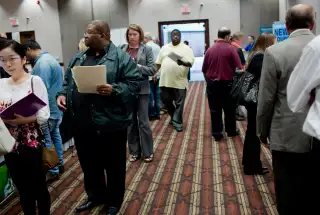Why More Older Workers Want a New Job

America is clearly a nation of job hoppers—and it's not just Millennials. Four in 10 experienced workers want a new job in 2016, most of them citing a desire for better pay, according to a survey from AARP.
That may seem surprising, since it's younger workers who are expected to switch jobs frequently. Among Millennials, the median job tenure is just two years, according to PayScale. A third of companies lose 15% of their millennial workforce every year, Millennial Branding and Beyond.com found. But such job wanderlust is also evident among boomers and Gen X, though for slightly different reasons.
Often, older workers enjoy what they do and want to remain at work to stay engaged and active. But a large number also stay at work for financial reasons. The latter group is most evident in the AARP survey, where 74% of experienced workers cited better pay as their top motivation for wanting to switch jobs. After a slow jobs recovery, older Americans may finally be enjoying better employment prospects.
Yet more pay is not the only thing on older job hoppers’ minds. They also cite more enjoyable work (30%), better health benefits (28%), more flexible hours (25%), and career growth (21%). Interestingly, Millennials often express similar views as it relates to enjoyable, flexible employment, but they seem less motivated purely by a pay hike.
The biggest obstacle to a job switch: 42% of experienced workers cite age discrimination, followed by inability to get a pay raise (37%), and a poor local job market (24%). As a result, 24% expect to switch industries and 42% have no idea where they may end up.
Read Next: These Are the Best Jobs in America in 2016
Still, by planning ahead and doing some research, you can greatly improve your job switching opportunities. As a recent study found, some 82% of people 47 and older who tried to transition to new careers in the last two years were successful.
You can improve your odds of landing a new job that you like by networking relentlessly and demonstrating modern skills through a presence on LinkedIn, Twitter or other social media, among other strategies.You can also check out Money's career moves with advice for job seekers of all ages, including your 50s and your 60s.
And don't get discouraged. These days all generations are on the move.